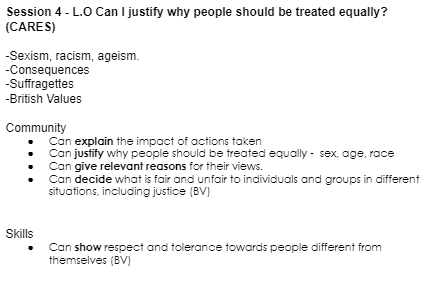Community & Aspiration: Equality
Religious Education: Philosophy
Session 1:
In session 1, the children learnt about Christians’ beliefs in helping others and the duty to act in a moral way. They also learnt the Hindu ideal of Ahimsa, which focuses on avoiding harm of living things.
Through discussion, the children learnt about the importance of being good to the followers of these religions.
The main activity of the session enabled the children to present their opinions by writing a paragraph that answered the following question: ‘Does following a religion make you more likely to be a good person than someone who doesn’t follow a religion?’
Session 2:
Session 2 introduced the concept of philosophy.
The theme of the session was ‘What makes me, me?’
The children learnt that Buddha taught that humans suffer because humans continually strive after things that do not give lasting happiness.
The main activity of the session was based on ‘Aspiration’ which encouraged the children to consider the important things that they want to achieve during their life and that putting varying degrees of importance of things in your life is a clear indicator of who you are.
In the children’s books, throughout the unit, the children recorded their results in low stakes quizzes that were set by the teacher. This approach shows an early attempt to reinforce the recall of knowledge by reviewing materials regularly.
Session 3:
In session 3, Year 6 continued to learn about fairness and the difference between fairness and equality.
During the session, the children debated the whether war was ever just? The children learnt that, both, Catholics and Muslims are peaceful, but both religions have a set of conditions that make war just.
Session 4:
Session 4 was focused on ‘Community’ from the CARE strands. This learning focused on objectives taken from the ‘Community’ progression grid.
Some of these objectives are clearly linked to our school’s approach to British Values (BV).
The hook to the lesson involved sweets being passed to certain groups of children and this was linked back to times in history where certain groups have been treated unequally, specifically the Suffragettes, with linked directly with Year 6’s English.
Using different examples, the children participated in a sorting exercise where they made decisions over whether something was an example of discrimination or not.
Session 5:
In Session 5, the concept of ‘free will’ was explored.
Through discussion, the children learnt the definition of ‘free will’ and debated whether humans are always responsible for their actions.
This session then moved on to discussing the similarities and differences between the Christian and Humanist views on ‘free will’. Using this knowledge, the children then wrote an evaluation of their thoughts: Do they agree with one? Do they think differently to both views? Do they believe they are responsible for their actions?
Throughout the planning, Collaborative Learning techniques have been planned, in order to facilitate high quality discussion.











Comments
Post a Comment